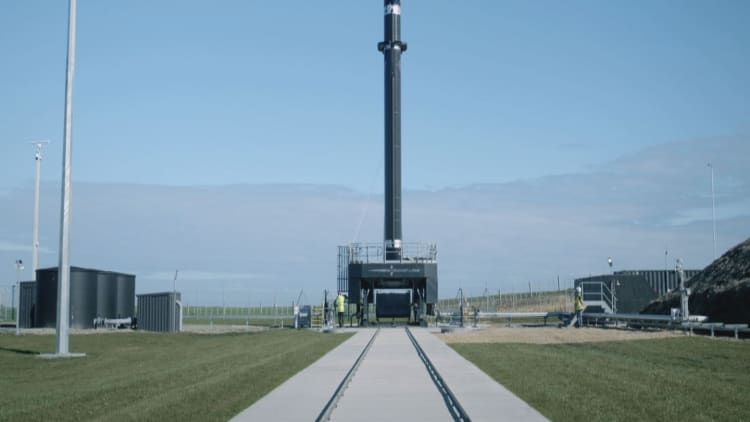
Small, privately built rockets are a burgeoning sector within the space industry, and out of more than 100 competitors, Morgan Stanley says Rocket Lab stands out as a disruptive front-runner.
Though the New Zealand and California-based company lacks the backing of billionaires like SpaceX's Elon Musk, Blue Origin's Jeff Bezos or Virgin Galactic's and Virgin Orbit's Richard Branson, it makes up for that with a history of successful launches and an "outlook for profitability," analyst Adam Jonas wrote in a note to investors on Tuesday.
Rocket Lab last raised $140 million, led by Australia's sovereign wealth fund. With nearly $290 million raised, it is one of a few space companies to reach the coveted tech unicorn status, with a private valuation of more than $1.2 billion.
The company makes and operates the 56-foot tall Electron rocket, which costs about $5.7 million a launch. Electron can send spacecraft about the size of refrigerator into orbit, far smaller than the payloads of bigger rockets.
But small rockets are a key part of the growing space industry. Previously, small satellite makers would have to hitchhike on larger rockets in "rideshare arrangements," Jonas said. Smaller rockets allow these companies to send their satellites to space more quickly.
Rocket Lab is among "the best positioned to take advantage of the smaller private satellite launch market," Jonas said, citing the convenience, low cost and sustainable approach of its rocket business.
The note is the latest in Morgan Stanley's "Space Disruptor Series," which features commentary on 90 companies by Morgan Stanley's "Space Team," which is led by Jonas.
"I think they got it right," Rocket Lab CEO Peter Beck told CNBC of Morgan Stanley's report.
Morgan Stanley's focus on space companies is "really important," Beck said. He believes Wall Street's slowly growing interest in space is happening "because there's a certain maturity in the marketplace right now."
"Certain things have to pass the smell test before Morgan Stanley takes a look," Beck said. "I often joke that I'm the first-non-billionaire to get to orbit ... we've proven that a purely venture capital-backed company can do these things."
Rocket Lab completed its first launch of 2019 on Thursday, with the successful R3D2 mission for the Pentagon's research division DARPA. That was Rocket Lab's fourth launch to orbit and the 25th satellite the company has put in space.
Ahead of the DARPA mission, Beck told CNBC he estimates there are 117 other companies seeking to build small rockets. Despite heavy investment in the technology in recent years, Beck expects there to be a narrow window for these companies to reach orbit and begin competing with Rocket Lab.
In addition to Beck, Jonas profiled Rocket Lab CFO Adam Spice and senior vice president Lars Hoffman. The former has 20 years of finance experience, especially in the semiconductor industry, while the latter led government sales at SpaceX, on top of 30 years in national security and aerospace sales.
Beck told CNBC last year that, after only a few launches, the company will "be cash flow neutral," a fact Jonas highlighted. Rocket Lab has an 18-month backlog of rocket launches scheduled. Additionally, it is "tracking around a $3 billion pipeline" in future launches, Beck said in November.
Beck was hesitant in a recent interview to declare his company the winner of the private small rocket race. With the caveat that it "depends on your definition of won," Beck did not shy away from noting the company's first mover advantage.
"We're the only ones putting s--- on orbit," Beck said.


